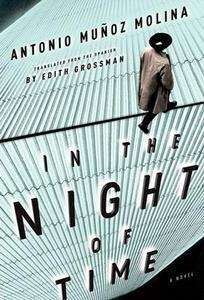In the Night of Time

Editorial Houghton Mifflin
Fecha de edición diciembre 2013 · Edición nº 1
Idioma inglés
Traducción de Grossman, Edith
EAN 9780547547848
656 páginas
Libro
encuadernado en tapa dura
Resumen del libro
Superb novel of the Spanish Civil War, ranking among the best of the many books written about that conflict. The war of 1936-39 remains an unhealed wound, and Molina (Sepharad, 2003, etc.) runs a certain risk--as, recently, did Javier Cercas with Soldiers of Salamis--in revisiting it. He does so from the point of view of an architect, Ignacio Abel, who has risen from the ranks of the working poor, his bricklayer father scorning and pitying him for his lack of macho strength, living a life in which "feeling the blow of the slap that hadn't yet struck his pale face" constitutes business as usual. Ignacio is a socialist but no firebrand; even so, he feels himself in danger, and throughout the narrative, even in flight, he wrestles with the question of whether he should stay in Spain and fight or move on to some place such as New York, where he has both a reputation and a lover. Problem is, even as he's wrestling with rationalizations (which "sounded like the lie of someone who's going to desert"), his lover is bent on going to Spain to join the loyalist cause herself. Ignacio is something of a cipher, even as others in his circle do their best to remain safe and anonymous--and for good reason, since Molina delivers a scathing, Goya-esque view of war: "Now the long whistles of mortars, and a few seconds later the earth rose in the fields along the highway like streams of lava in an erupting volcano." Molina writes with the epic sweep of Boris Pasternak, claiming the space hitherto occupied by the non-Spanish novelist Ernest Hemingway; his story is long but without a slack moment, as it carefully builds a portrait of a world that has disappeared and a moment that is about to: "Think of how big the world is," as Ignacio says, "how complicated it is for two people to meet. We've been lucky twice--there won't be another time." A simple love story at one level, a broad portrait of a nation in flames at another, and a masterwork through and through. COPYRIGHT(2013) Kirkus Reviews, ALL RIGHTS RESERVED.
Biografía del autor
Antonio Muñoz Molina nació en Úbeda (Jaén) en 1956. Ha reunido sus artículos en volúmenes como El Robinson urbano (1984) o La vida por delante (2002). Su obra narrativa comprende Beatus Ille (1986), El invierno en Lisboa (1987), Beltenebros (1989), El jinete polaco (1991), Los misterios de Madrid (1992), El dueño del secreto (1994), Ardor guerrero (1995), Plenilunio (1997), Carlota Fainberg (1999), En ausencia de Blanca (2001), Sefarad (2001), Ventanas de Manhattan (2004), El viento de la Luna (2006), La noche de los tiempos (2009), Como la sombra que se va (2014), Un andar solitario entre la gente (2018), Tus pasos en la escalera (2019), El miedo de los niños (2020), Volver a dónde (2021), No te veré morir (2023), el volumen de relatos Nada del otro mundo (2011) y el ensayo Todo lo que era sólido (2013). Ha recibido, entre otros, el Premio Príncipe de Asturias de las Letras, el Premio Planeta, el Premio Jerusalén, el Prix Médicis Étranger y fue finalista del Premio Man Booker International con su novela Como la sombra que se va en 2018. Desde 1995 es miembro de la Real Academia Española. Vive en Madrid y está casado con la escritora Elvira Lindo.








